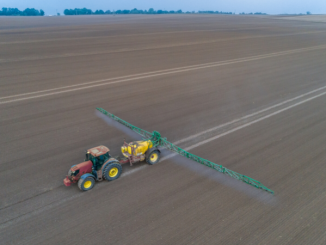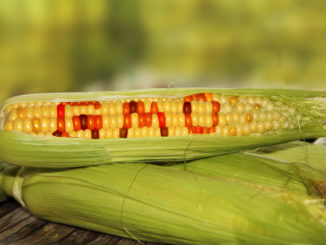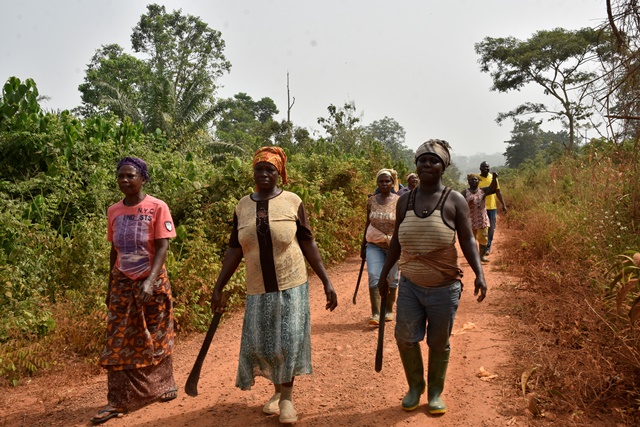
After “organic,” “non-GMO,” or even “palm-oil free,” there may be a new label coming to products for EU consumers: “Deforestation-free.” But might there be unintended consequences for some of the world’s poorest smallholders, who also happen to be those least responsible for climate breakdown? Ashley Parsons and Oliver Moore report.
The train to stop the EU’s contribution to global deforestation has left the station – or almost. That train is a little closer to departure after Monday February 21, with the conclusions of an Agriculture Council (AGRI) policy debate to regulate the import and export of products associated with deforestation. The debate on the Deforestation-Free Supply Chains Regulation (“minimising the risk of deforestation and forest degradation associated with products placed on the EU market”) was based on a policy note prepared by the French presidency.
Stopping and reversing deforestation and ensuring products that reach the EU market are “deforestation-free,” – meaning the growth or production of the commodity is not linked to deforestation – are high on the priority list for Julien Denormandie during his tenure. The debate raised a number of questions:
– Which ecosystems and commodities should be prioritised in order to make European action against deforestation as relevant as possible?
– To what extent do the key concepts of the text allow the objective of combating deforestation and forest degradation to be achieved, taking into account the diversity of forest situations?
– What are the important factors for ensuring efficient implementation of the Regulation?
Which Ecosystems and Commodities to Include?
The proposed Regulation applies to six commodities (coffee, cocoa, palm oil, soya, cattle and wood) and their derivatives. According to the impact assessment, these six commodities account for the largest share of EU-driven deforestation among the eight products analysed: palm oil (33.95 %), soy (32.83 %), wood (8.62 %), cocoa (7.54 %), coffee (7.01 %) and beef (5.01 %).
According to a Commission estimate between 1990 and 2008, EU consumption led to 10% of global deforestation. An EU-wide deforestation-free mandate would require due-diligence for companies placing products on the EU market, but a number of issues regarding the scope and extent of the proposed regulation have been raised. These regulations are part of a larger EU initiative to combat global deforestation, led by the Committee on Environment, Public Health, and Food Safety (ENVI).
Currently excluded from the Regulation are rubber, leather, maize and other kinds of meat, linking pigs and chickens to “embedded deforestation” through the use of soy as animal feed. This is despite the findings of another EU paper, released in 2019, that included maize and rubber as contributors to the problem of global deforestation.
Regarding ecosystems, at present, the Regulation does not include grasslands, wetlands or savannahs. It also excludes wooded grasslands and peatlands, which some argue should be included. According to Sini Eräjää, Greenpeace EU agriculture and forest campaigner, speaking to The Guardian, “If this law does not extend its protection to wetlands, savannahs, peatlands, and others, then consumption in Europe will continue to devastate natural areas that provide livelihoods for indigenous people, homes for countless species and essential defense against climate breakdown.”
According to a background note on the policy debate, “discussions within the Council should make it possible to clarify the content and implications of the text, particularly the definitions so that the Regulation can achieve its objectives: halt the decline in forest cover worldwide, conserve forest ecosystems in good condition and achieve the ambitious objectives of the transition to a greener economy and carbon neutrality.”
This continuity of language within the text will make it possible to rank countries wishing to export their products to the EU as high, standard, and low risk, as they relate to deforestation practices, with controls on relevant exports depending on their status.
To build a viable deforestation free label, the Regulation relies on a system of checks and penalties to ensure the effectiveness of the system. Critics have noted that there is a lack of positive incentives to reward nations that take action against deforestation.
The Council discussed how to fully predict and understand the possible outcomes of this system and its mechanisms for highest efficiency.
July 2019 – The European Commission presented a communication proposing ways to step up EU action to protect the world’s forests. 19 October 2020 the Commission published its work programme for 2021, including annexes referencing a legislative proposal and impact assessment aimed at minimising the risk of deforestation and forest degradation associated with products placed on the EU market, foreseen for the second quarter of 2021. 22 October 2020 the European Parliament adopted on a legislative initiative resolution with recommendations to the Commission on an EU legal framework to halt and reverse EU-driven global deforestation. (see separate file). 17 November 2021 the European Commission tabled its proposal for a regulation on deforestation-free products. The proposed regulation would impose a duty of due diligence on operators placing specific commodities or products on the EU market – or exporting them from the EU – with the aim to make sure that the goods have been produced on land not subject to deforestation or forest degradation after 31 December 2020; and that they have been produced in accordance with the laws of the country of production.
At the Monday meeting in Brussels, ministers highlighted the need for clear definitions in the due diligence system that align with the EU’s forest policy, with the hopes of lessening the burden (administrative and financial) on small operations. They also called for consistency in enforcing the regulation in all Member States, and to encourage good relations with non-EU countries.
The AGRI Committee’s contribution to the law is just a small part of a massive push to stop and reserve global deforestation. Another, potentially far more important, policy debate will take place on the proposal on March 17, during the Environmental Council. The European Parliamentary Research Service released an overview of the objectives of the framework: “The future framework should guarantee not only the legality, but also the sustainability of the harvesting, production, extraction and processing of the commodities in the country of origin, and include the protection of human rights, in particular land tenure, land and labour rights, with a special view to the rights of indigenous peoples and local communities. It should also cover high-carbon stock and biodiversity-rich ecosystems other than forests.”
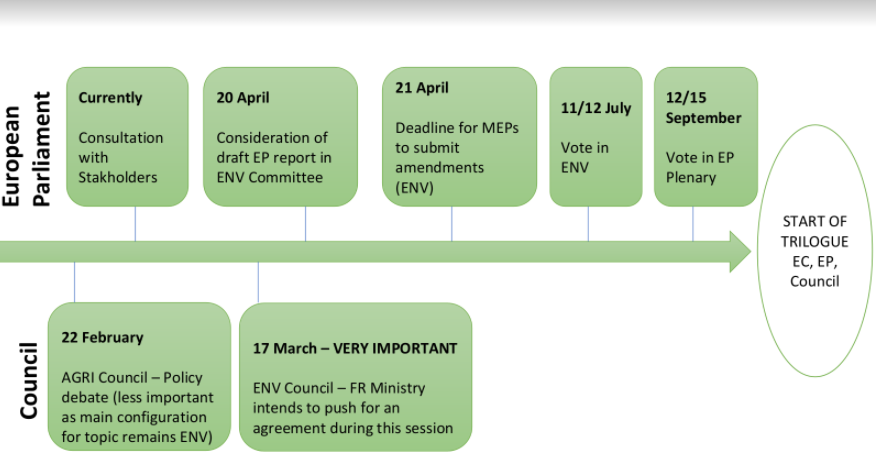
Fine, but…
A number of concerns have been expressed at this fast moving – by EU standards – regulation. Indeed, speed, and time, are issues for a wide range of observers.
Including the Deforestation-Free Supply Chains Regulation as part of the package of nine Green Deal and European Climate Law approaches, Alan Matthews cited four needs:
- A sufficient transition period to allow alternatives to be developed, applying the principle of special and differential treatment where health and safety of EU consumers is not the issue
- The commitment of significant EU resources to help farmers in vulnerable developing countries to adapt their production practices where justified
- Just transition principles in Europe emphasise that those affected by change should be consulted and have a say in managing that change. This principle should also apply to the external dimension of the Green Deal
- EU decision-making must have mechanisms where the interests and needs of these countries are explicitly considered.
The EU should pay special attention to high-risk areas identified through the EU’s own country benchmarking system when designing support programmes.
Coffee and Cocoa Smallholders
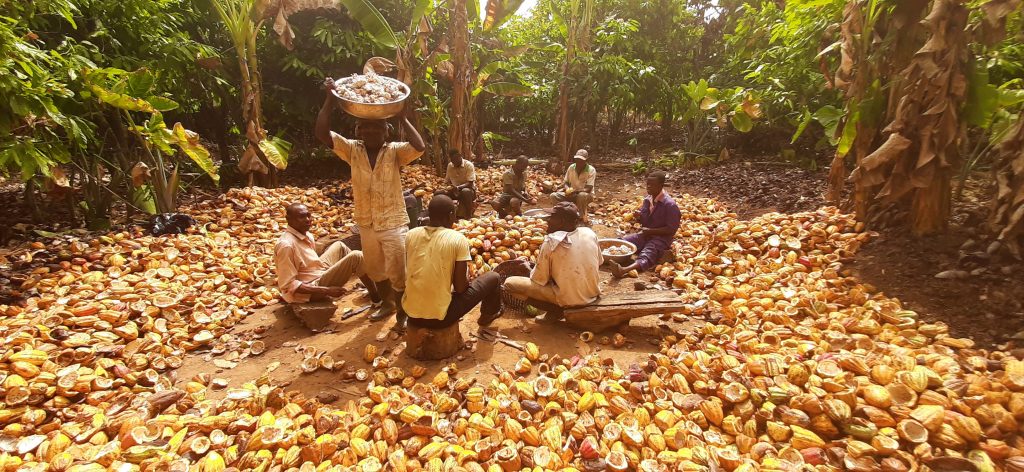
This proposal can be seen as a well intentioned piece of legislation, but one that initially risks punishing small operators unless there is some significant tweaking. Large companies will be able to shift production to less risky regions of the world, and adapt to meet the standards through various means. but what of those left behind?
Fair Trade Advocacy is concerned for smallholders, especially in commodities such as cocoa and coffee – at the lower end of the responsibility spectrum when compared to palm oil and soy. “Applying simplified due diligence to companies sourcing from “low-risk” countries entails a worrying degree of uncertainty as regards potential counterproductive impacts on the ground, both for people and the planet. This might indeed prompt a cut-and-run wave from companies sourcing from “high-risk” countries, driving producers in greater poverty while increasing the environmental pressure on the forests of neighboring countries. A further assessment would be needed.”
In fact, like most climate issues, human rights are also a factor in creating a deforestation-free label. If small holders cannot adapt fast enough to comply with a new EU deforestation-free regulation and their own country’s regulations at the same time, they risk being forced to shift their goods to different markets. Methods to help small holders develop more sustainable practices, while maintaining access to the EU market, should be considered and integrated into the regulation, to avoid these producers losing their EU market access and thereby forcing them back into unsustainable practices to make ends meet.
Research by Jason Hickel, published in the Lancet in 2020 showed that 8% of global greenhouse gas emissions since 1850 have emanated from the global south.
Fairtrade Ireland has launched a letter for organisations and individuals to sign up to. In it, it states: “The vast majority of these cocoa and coffee smallholders work on farms smaller than five hectares, and are living in extremely vulnerable contexts. In cocoa and coffee supply chains, the deforestation regulation will only meet its objective to curb deforestation if the root causes are addressed. These include, smallholder poverty, poor land & forest governance, climate change, lack of access to information and finance.”
Eight Steps for a just transition for cocoa and coffee smallholders to access a deforestation-free and forest degradation-free European market.
Assess the impacts on cocoa and coffee smallholders conducted before the regulatory proposal passes into law.
Tackle root causes of deforestation as a precondition to reduce the EU deforestation footprint.
Engage responsibly with cocoa and coffee smallholders and their producer organisations.
Refer explicitly to international standards of human rights.
Combine traceability requirements with adequate support and safeguards on data ownership for cocoa and coffee smallholders and their producer organisations.
Refer explicitly to international standards of human rights.
Combine traceability requirements with adequate support and safeguards on data ownership for cocoa and coffee smallholders and their producer organisations.
Leverage partnerships, cooperation mechanisms and other financial tools to support smallholders’ compliance with new requirements and jointly address root causes of deforestation.
To Conclude
As Green Deal components become a reality in regulations and in legislation, these issues of impacts and Just Transition will pop up again and again. In fact, this power disparity has reared its head even before this. In our recent reporting on EU Quality Labels and CAP’s Common Market Organisation, Melina A Campos found similar issues of unfairness for producers and their organisations on the ground. Compliance to Quality Label standards is sometimes demanded, without benefits actually flowing to those the producers operating to this higher standard: product differentiation is often denied to these producers in European Markets.
While the need for rapid change in many areas of agri-food is clear, the principles of Just Transition are key to getting it right.
The debate is far from over. Prior to the March 7 Environmental Council, Fair Trade Ireland will be hosting an event lead by Juan Pablo Solis, Fairtrade international’s lead on climate issues, Bismark Kpabitey, from Ghana and representing producers in West Africa, and Jose Omar Rodrigez Romero from Honduras to ask the EU to amend their proposals on deforestation to be fair to small-holder-farmers and to forests. On next Tuesday 1st March, at 2PM Irish time, interested parties can register for the event here.
More
https://www.greens-efa.eu/opinions/2021/11/17/new-eu-deforestation-law-could-fail-to-protect-our-precious-ecosystems/
Quality Schemes – Who Benefits? Central America, Coffee and the EU
CAP Beyond the EU: The Case of Honduran Banana Supply Chains



